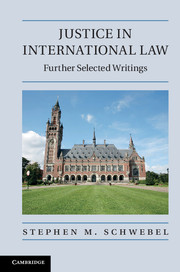Book contents
- Frontmatter
- Contents
- PART I International Court of Justice
- PART II International arbitration
- PART III Miscellaneous
- 27 May preparatory work be used to correct rather than confirm the “clear” meaning of a treaty provision?
- 28 Clean hands, principle
- 29 Compound interest in international law
- 30 The prescience and pertinence of the ILO
- 31 Is mediation of foreign investment disputes plausible?
- 32 Hersch Lauterpacht: fragments for a portrait
- 33 International Law: Being the Collected Papers of Hersch Lauterpacht
- Collected publications, judicial opinions and book reviews
- Index
30 - The prescience and pertinence of the ILO
from PART III - Miscellaneous
Published online by Cambridge University Press: 07 September 2011
- Frontmatter
- Contents
- PART I International Court of Justice
- PART II International arbitration
- PART III Miscellaneous
- 27 May preparatory work be used to correct rather than confirm the “clear” meaning of a treaty provision?
- 28 Clean hands, principle
- 29 Compound interest in international law
- 30 The prescience and pertinence of the ILO
- 31 Is mediation of foreign investment disputes plausible?
- 32 Hersch Lauterpacht: fragments for a portrait
- 33 International Law: Being the Collected Papers of Hersch Lauterpacht
- Collected publications, judicial opinions and book reviews
- Index
Summary
In these days in which concern over foreign “cheap labor” is the daily stuff of headlines, in which that concern is the focus of debates over ratification of the North American Free Trade Agreement (NAFTA) and over the external policies of the European Community, it is clear that, if the ILO did not exist, it would have to be invented. How topical the concerns of the ILO are! In 1919 either the founders of the ILO were remarkably prescient, or labor problems have remained singularly intractable, or both, for the very problems of varying labor standards and unacceptable social standards which concerned the ILO's founders are still very much with us today. Indeed, the agenda of the ILO may be said to be even more central to national and international well-being than it ever was, because the contemporary dynamic mobility of capital has thrown problems of varying international labor and social standards into still sharper relief. That mobility provokes disputes not only between developed and developing countries. It gives rise to disputes between the developed. Nor do the processes of regional integration obviate such concerns, as differences of view over adhesion to the social chapter of the Maastricht Treaty, and to NAFTA, illustrate.
These days equally are days of the non-governmental organization, of “people power,” of privatization, and, in these regards as well, the structure no less than the focus of the ILO is altogether modern.
- Type
- Chapter
- Information
- Justice in International LawFurther Selected Writings, pp. 314 - 317Publisher: Cambridge University PressPrint publication year: 2011



